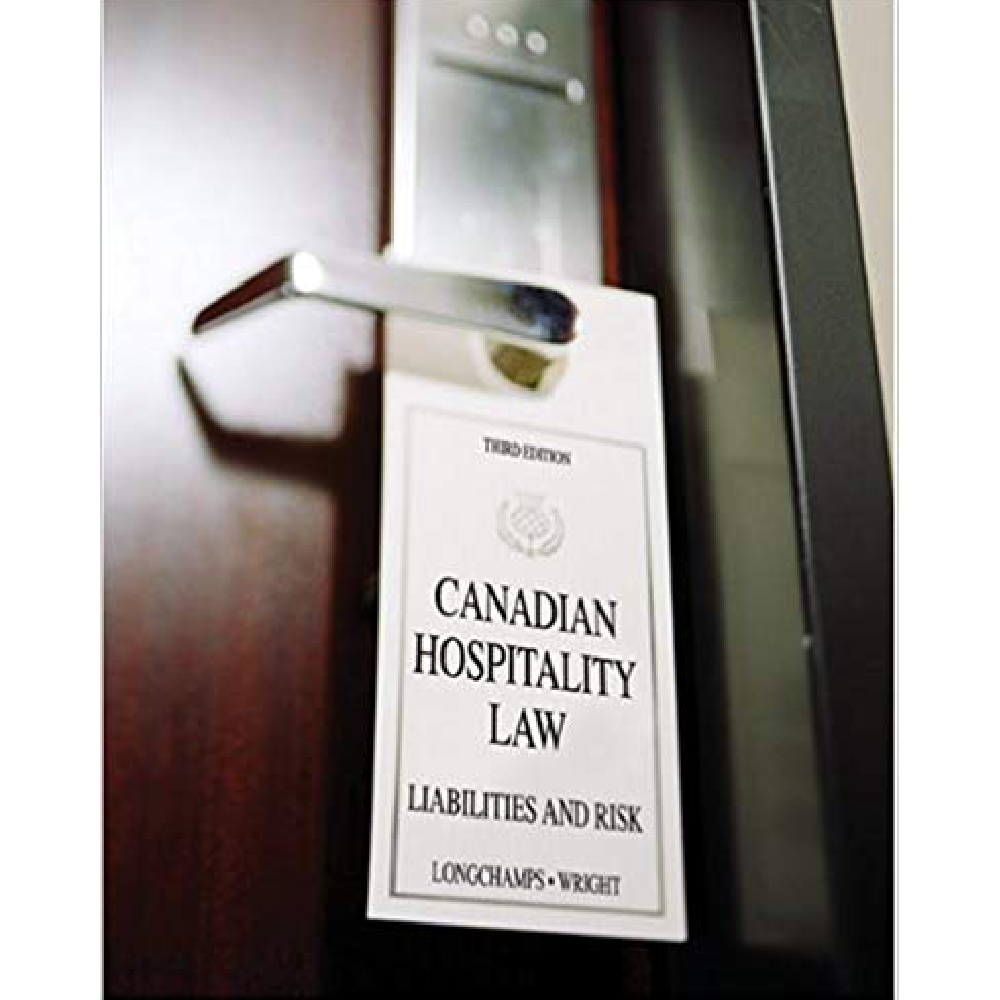Canadian Hospitality Law 3rd Edition By Don Longchamps – Test Bank
Chapter 11
Protection of Guests and Their Property
INTRODUCTION
As discussed in Chapter 9, guests were historically vulnerable to unscrupulous innkeepers. The solution of the common law judges, travellers themselves, was to impose absolute liability on innkeepers for the safety of guests and their property. The nature of the liability depends upon the legal relationship of the parties. Innkeepers still have a duty to nonguests, but it is lower than to guests.
COMMON LAW LIABILITY FOR GUEST PROPERTY
The Absolute Liability Rule
Under common law, and in the absence of an exculpatory contract between the parties, innkeepers are absolutely liable as full insurers for the safety of the property of guests, regardless of all due care. This duty exists only for those in an IGR and does not apply, for example, to casual patrons of the restaurant in a hotel.
Once the IGR is established and the guest suffers a loss, the innkeeper is responsible for the entire loss. The duty continues as long as the relationship is in existence.
Williams v. Linnit
Under common law, innkeepers could not contract out of strict liability and could not avoid liability by warning guests of dangers and informing them to keep everything under lock and key.
Ford v. Seligman
A long-term lodger of a hotel had his property stolen. The relationship was not an IGR but a landlord–tenant relationship. Thus, there was no absolute liability.
Lynar v. Mossop
P did not use the room for overnight accommodation and thus was not a guest. Absolute liability did not apply.
Exceptions to the Absolute Liability Rule
1. The guest’s own negligence. If the damages result from the guest’s own actions, the hotel is not liable.
2. Acts of public enemies. Defined as enemies of the government in acts of war or terror.
3. Acts of God. Innkeepers not liable for losses due to an act of God, e.g., hurricanes and lightning strikes.
Barrie v. Wright
P checked into a hotel. The carrier delivered P’s luggage later and left it in the hall, where it was stolen. The trial court held the defendant hotel liable for the loss. The hotel’s appeal was dismissed, but the appeal court did say that a guest could be contributory negligent with respect to his or her own property even to the point of exonerating the hotel (though not in this case). The appeal court further held that the degree of care owed by a hotel could vary depending on such considerations as the capacity of the hotel, the number of guests, and the size of the community in which the hotel is located.
Infra Hospitium
The innkeeper is responsible for the property of guests brought into the hotel (“infra hospitium”). This extends to the guest’s vehicle and any contents that are reasonably associated with it or stored in it to the innkeeper’s knowledge. Items not reasonably associated with a car or stored in it to the innkeeper’s knowledge must be brought into the hotel itself to enjoy the protection of the innkeeper.
George v. Williams
P parked his car in the lot of the hotel where he was a guest. P’s belongings were stolen from the car. The car was infra hospitium, but the chattels in the car were extra hospitium, because they were not reasonably associated with a car and their presence in the car was unknown to the hotel.
STATUTORY LIMITATIONS
Purpose of the Limitation
The purpose of the common law, absolute liability, was to put an end to the frequent loss of property by guests. This changed a legal imbalance favouring innkeepers to a legal imbalance favouring guests. To soften the harsh effects of the common law on innkeepers, all Canadian jurisdictions have legislation limiting an innkeeper’s liability for loss or damage to the property of guests. This has restored some balance to the equation, but to the extent that the imitation amount is lower than the value of the guest’s lost or damaged property. See Newfoundland’s Innkeepers Act, page 220.
Limitation Provisions
Generally, strict compliance with the statute is required. Typically, it sets an upper limit of recovery and must be posted in specific locations. Any loss that is the result of the innkeeper’s neglect, willful act, or default is not protected by the statute.
Laing v. Allied Innkeepers Ltd.
Laing, a registered guest at the motel, placed his wallet on the top of the dresser before falling asleep. A thief entered the room through a balcony door. The Innkeepers Act was posted in the guest’s room, but not in the office, public rooms, and every bedroom as required by the Act. The hotel did not comply with the posting requirements and thus could not rely on the limitation.
The liability limit varies from jurisdiction to jurisdiction and is very low everywhere in Canada except Manitoba, which has no liability provision. In the United States, the amount of liability has been revised to better reflect the value of modern goods that guests bring to an inn reaching as much as $2,000. See Section 8 of Manitoba’s Hotel Keepers Act, pages 220–221.
A guest can ask the hotel to store valuables, i.e., items that are not part of the guest’s normal belongings. If the innkeeper does so, the innkeeper will become absolutely liable for the valuables in storage. However, innkeepers can require guests to store valuables in a vault. Innkeepers will be liable for only the limitation amount if the guest fails to use the vault.
Disclosure of Value
Innkeepers may request guests to use outside storage facilities if the value of the items is excessive. Whether an inn can refuse storage depends on the jurisdiction. In Newfoundland, for example, an innkeeper who informs the guest that there is no vault is not liable. Absolute liability arises when a guest is unable to deposit his valuables in a vault that exists. In Ontario, the statutory limitation does not apply to goods stored in the vault, and a hotel that has no vault is absolutely liable for the storage. Carry lots of insurance. Disclaimers of liability are invalid.
Whitehouse v. Pickett
For an “express deposit” to take place, something must be said to convey the guest’s intention to deliver the property and the innkeeper’s intention to receive it such that the innkeeper agrees to make himself liable. A bag of unknown value deposited with an innkeeper does not constitute an express deposit
Posting Requirements
Requirements vary from jurisdiction to jurisdiction, but typically require that they be posted in various visible locations in clear language in sufficiently large print. It is essential that the statutory posting requirements be followed to the letter. It cannot hurt to exceed them.
DISCUSS: Posting requirements in your jurisdiction.
Sherrill v. King Edward Hotel Co.
P, a guest, had his property stolen from his room. The notice informing of the availability of a vault and of the limitation of liability was not conspicuously posted as required. D was liable.
Seller’s Samples
Innkeepers are generally only responsible for personal items, not business items. If the hotel receives actual notice of samples and their value, the hotel is liable up to the amount specified in the limiting legislation.
Equitable Estoppel
If an innkeeper gives notice to the guest that the hotel’s liability is greater than the limited amount, the hotel cannot rely on the statutory limitation, but is liable for the greater amount. Train staff to avoid doing this.
Animals
The statutory limitation does not apply to live animals and any gear pertaining thereto.
Vehicles
Liability may be subject to statutory limitations.
Fire Damage
Except where the fire is caused by the innkeeper’s own negligence or willful act, recovery for property lost or damaged by fire is limited to the statutory amount.
Ponson v. Premier Hotel Ltd.
P occupied a room for several years paying a monthly rental. Fire destroyed the hotel and P’s property.
Ruling: P was a permanent lodger and was owed only reasonable care. Hotel not negligent in the performance of its duties.
Liened Property
Innkeeper is responsible for liened property until it is sold; however, the statutory limitations would apply.
Frank v. Berryman
P was unable to pay for his stay and the hotel liened his luggage. The property was placed in the hotel’s reading room because the baggage room was full. Someone opened the luggage and stole several items. Ruling: D had failed to take reasonable care.
The Guest’s Conduct
Negligence on the part of the guest may reduce or negate the liability of the innkeeper.
Vicars v. Arnold
P was given a room for which there was no key. His overcoat was taken from his room. Ruling: as the IGR had commenced, the innkeeper was liable.













Reviews
There are no reviews yet.